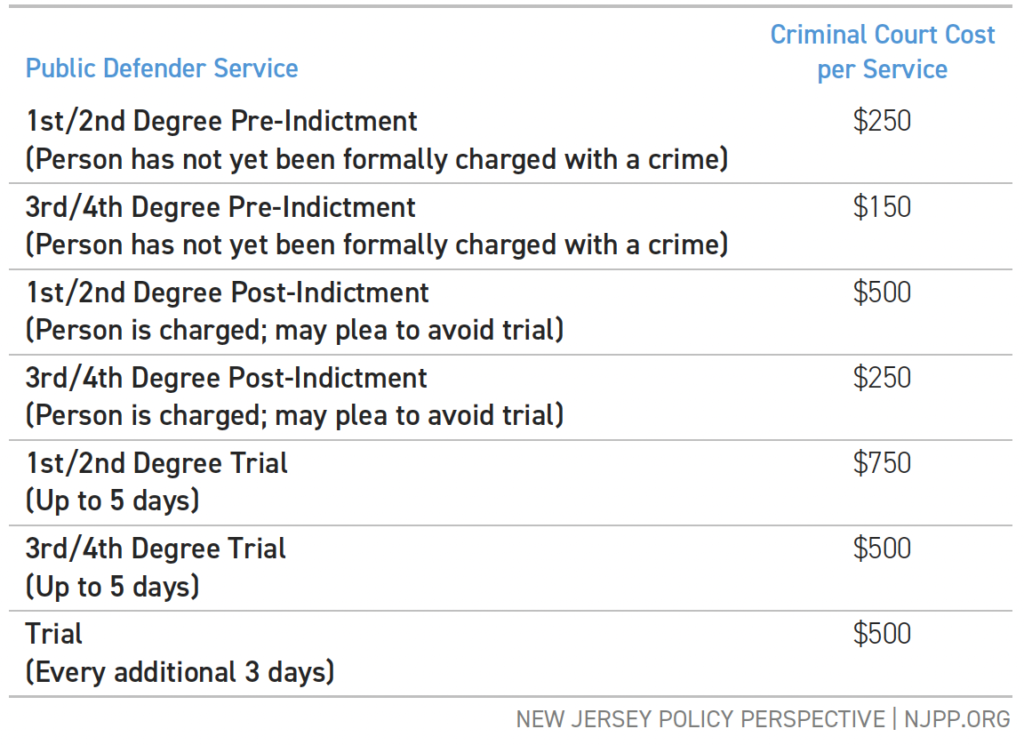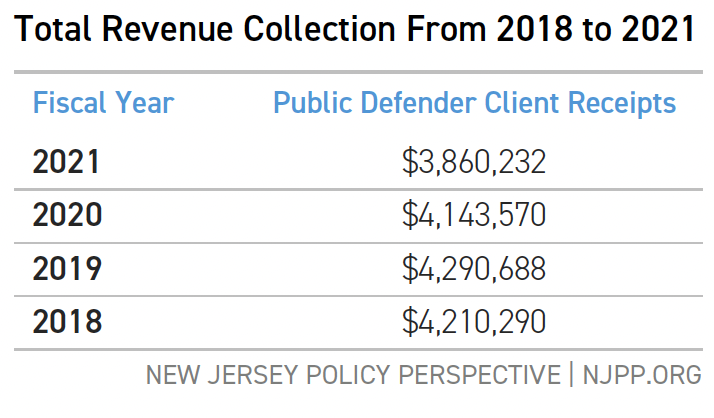By
Published on Oct 24, 2022 in Public Safety
Every person should have access to a lawyer when accused of a crime. In fact, the phrase “if you cannot afford an attorney, one will be appointed for you,” is commonly heard on television and in popular culture.[i] However, free legal counsel is a myth in New Jersey. Despite the constitutional right to a lawyer, New Jersey charges fees for clients who are appointed to public defenders — fees that can leave their clients in debt and can influence how they navigate the justice system.
New Jerseyans with low incomes — even those under the federal poverty rate — have to pay for their right to representation with a public defender, even when they demonstrate financial indigence. The costs — or fees — are presented after a client goes through an application process to prove their inability to pay for an attorney,[ii] and the costs can be upwards of $1,000 per client.
At minimum, state law requires that the public defender’s office charge defendants at least $150 and requires payment within six months of the case.[iii] If the defendant cannot pay in full within that timeframe, they will become in debt to the State of New Jersey.[iv] This debt can result in liens on assets, which can damage an individual’s credit and result in garnishing any tax returns or inheritance.[v] Further, the consequences of these fees can be devastating — roughly one-third of American adults cannot cover a $400 expense without going into debt or selling assets.[vi]
What’s worse, these fees encourage defendants to plead, regardless of the facts of their case. For example, accepting a plea bargain for a lower-degree offense not only reduces potential prison time or other penalties but also can reduce public defender costs by 65 percent (from $750 to $250).[vii]
Public Defender
A lawyer who works for and is appointed by the state for clients that cannot afford representation.
Indigence
When a client has proven that not only do they live below the poverty line, but they have no resources to help pay for an attorney.
Plea
An agreement in which the defendant pleads guilty to a less serious charge, or to one of several charges, in return for the dismissal of other charges; or they may plead guilty to the original criminal charge in return for a lighter sentence.
Fee Schedule For New Jersey Office of the Public Defender[viii]
 While the costs for indigent New Jerseyans can be insurmountable, the cash returns for the state are small. Anticipated revenue for Fiscal Year 2022 from clients of the Office of the Public Defender (OPD) is about $4 million,[ix] a mere 0.008 percent of the state budget.[x] There are also unaccounted-for administrative costs associated with debt collection.[xi]
While the costs for indigent New Jerseyans can be insurmountable, the cash returns for the state are small. Anticipated revenue for Fiscal Year 2022 from clients of the Office of the Public Defender (OPD) is about $4 million,[ix] a mere 0.008 percent of the state budget.[x] There are also unaccounted-for administrative costs associated with debt collection.[xi]
The High Cost of Public Representation[xii]
 The state Legislature, Judiciary, and Attorney General have taken some steps to reduce the negative impact of fines and fees, such as halting arrest warrants for debt from unpaid fines and fees.[xiii] However, even cursory interaction with criminal courts can result in long term financial disaster for individuals and families across New Jersey.[xiv]
The state Legislature, Judiciary, and Attorney General have taken some steps to reduce the negative impact of fines and fees, such as halting arrest warrants for debt from unpaid fines and fees.[xiii] However, even cursory interaction with criminal courts can result in long term financial disaster for individuals and families across New Jersey.[xiv]
Due to inequitable outcomes for individuals in the criminal justice system, neighboring states, like New York and Pennsylvania, do not charge for legal representation, and neither should New Jersey.[xv] To have a more equitable justice system, the state should eliminate all public defender fees and fund residents’ constitutional right to an attorney through sustainable public funding. Access to a constitutional right should not come with a price tag.
End Notes
[i] Ronald Steiner, Rebecca Bauer & Rohit Talwar, The Rise and Fall of the Miranda Warnings in Popular Culture, 59 Cleveland St. L. Rev. 219 (2011).
[ii] In municipal courts, application fees for representation by a public defender can be as high as $200. N.J. Stat. Sec. 2B:24-17. However, the New Jersey Office of the Public Defender has eliminated application fees.
[iii] N.J. Admin. Code Sec. 17:39-3.1
[iv] N.J. Stat. Sec. 2A:158A-17
[v] N.J. Stat. Sec. 2A:158A-17
[vi] Board of Governors of the Federal Reserve System, Economic Well-Being of U.S. Households in 2021 (May 2022), p. 35-36.
[vii] According to the fee schedule, pre-trial costs for 3rd and 4th degree offenses are $250, but can jump to $750 as soon as one decides to go to court.
[viii] N.J. Admin. Code Sec. 17:39-3.1
[ix] https://pub.njleg.state.nj.us/bills/2022/S2500/2023_I1.PDF#page=6
[x] New Jersey State Budget for Fiscal Year 2023 is $50.6 billion.
[xi] Marea Beeman et al., National Legal Aid and Defender Association, At What Cost? Findings from an Examination into the Imposition of Public Defense System Fees (July 2022), tbl. 2 at p. 15, https://www.nlada.org/sites/default/files/NLADA_At_What_Cost.pdf?v=2.0
[xii] NJPP analysis of state budget documents, all dollar amounts are adjusted for inflation.
[xiii] New Jersey Office of the Attorney General. Acting AG Platkin Issues Policy to Address Negative Consequences of Large Number of Outstanding Bench Warrants for Low-Level Offenses (May 2022). https://www.njoag.gov/acting-ag-platkin-issues-policy-to-address-negative-consequences-of-large-number-of-outstanding-bench-warrants-for-low-level-offenses/
[xiv] Joni Hirsch & Priya Sarathy Jones, Driver’s License Suspension for Unpaid Fines and Fees: The Movement for Reform, 54 U. Mich. J. Law Reform 875 (2021) (outlining how relatively minor driver’s license suspensions harm earnings ability without improving public safety). https://repository.law.umich.edu/cgi/viewcontent.cgi?article=2535&context=mjlr
[xv] Marea Beeman et al., National Legal Aid and Defender Association, At What Cost? Findings from an Examination into the Imposition of Public Defense System Fees (July 2022), pgs. 98-99, https://www.nlada.org/sites/default/files/NLADA_At_What_Cost.pdf?v=2.0

